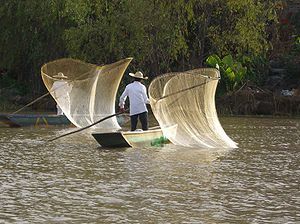By Burnett Munthali
Chiefs from eight districts have been urged to emulate efforts by Senior Chief Makanjira of Salima district in managing fishing activities at Benje Island.
These are districts where restoring fisheries for sustainable livelihoods (Refresh) project is being implemented. They include Mangochi, Dedza, Karonga, Nkhotakota, Likoma, Nkhata Bay, Salima and Rumphi.

Chief of Party for Refresh project Daniel Jamu said this during the opening of Benje Island, which was closed in December to allow fish to breed.
Jamu stressed the need for other chiefs to learn from what Senior Chief Makanjira is doing as Refresh aims at promoting decentralized fisheries management with the communities taking charge of their resources.
Salima district fisheries officer, Patrick Zakeyu echoed Jam’s sentiments while describing the opening of Benje Island as a milestone in the fisheries sector.
Meanwhile, Senior Chief Makanjira pledged to continue supporting the government in scaling up the fisheries sector by providing guidelines to deal with illegal fishing at the island.
Pact Malawi is implementing ‘Restoring fisheries for sustainable livelihoods’ with funding from USAID.
The ecosystems that support fisheries, together with other economic activities, are subject to a number of alterations of significant relevance to their functioning and resilience and to the goods and services they can provide. Because of our imperfect understanding of ecosystem structure and functioning, as well as the inherent difficulty of distinguishing between natural and human-induced changes, the latter are not always perfectly predictable and/or reversible. The following sections elaborate briefly on some types of alteration.
Fisheries management is crucial to ensure that fishing activities are conducted in a way that minimizes detrimental impact on fish stocks and ecosystems. It is also instrumental in achieving the socio-economic objectives governments and stakeholders have for fisheries.
Poorly-managed large-scale mariculture can damage coastal wetlands and nearshore ecosystems, often used as nurseries by key capture fishery resources, and contribute to ecosystem contamination with food residues, waste, antibiotics, hormones, diseases and alien species.


